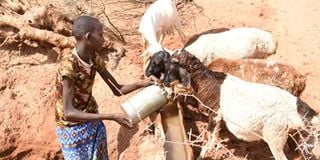Premium
To beat drought, relive the Maathai legacy

Every time we experience drought and go out to look for afforestation and reforestation as a solution, we think of the late Nobel laureate Wangari Maathai.
After the government declared the prevailing drought a national disaster, many Kenyans, especially in the arid and semi-arid lands (Asal), fear for the future.
Planting trees may be a lasting solution to fight recurrent drought. Trees play an important role in the preservation of nature. Every time we experience drought and go out to look for afforestation and reforestation as a solution, we think of the late Nobel laureate Wangari Maathai.
Prof Maathai, fondly known as “Mama Miti” (the mother of trees), founded the Green Belt Movement in 1977. The movement strives for better environmental management, community empowerment and livelihood improvement using the tree as the entry point. It works both nationally and internationally.
The organisation has planted over 51 million trees in the country. Before the death of the legendary environmentalist in 2011, they have carried out many projects geared at conservation.
Any time we experience heavy rains in the country, we can’t fail to remember her legacy. If we can emulate her, the country can find a lasting solution to the drought.
Drought intensifies as a result of climate change. Planting trees in all the regions, whether affected or not, may help to bring rain. It is evident that drought leads to changes in the forest structure, composition and productivity.
When trees are planted in the areas that are not affected, they may experience high rainfall that can be useful in growing crops that can be later supplied to the drought-stricken areas.
Kenya Forest Service (KFS) should ensure that forests are managed well and taken care of. Cutting down of trees should be avoided. They should also enforce the law and regulations about charcoal burning and reckless forest utilisation. Culprits should be charged in court for environmental degradation.
KFS should promote forestry education and training, particularly the importance of planting trees. The Ministry of Environment and Forestry, under Cabinet Secretary Keriako Tobiko, should ensure that tree seedlings are supplied throughout the country, especially to areas that can easily access water. Asals should be supplied with drought-resistant trees that can withstand dry spells.
Tree planting should be encouraged in schools. Teachers should encourage students to grow seedlings and plant trees as a way of environmental conservation. They should have regular tree planting sessions in school.
In February 2013, a school in Chile introduced a “Tale for trees” — a local level organisation sharing lessons and stories of Prof Maathai and her Green Belt Movement. This worked in schools across the Lo Barnechea municipality. It conducted education days, when schoolchildren were educated on environmental conservation and sustainability.
Bill Otieno, Migori





